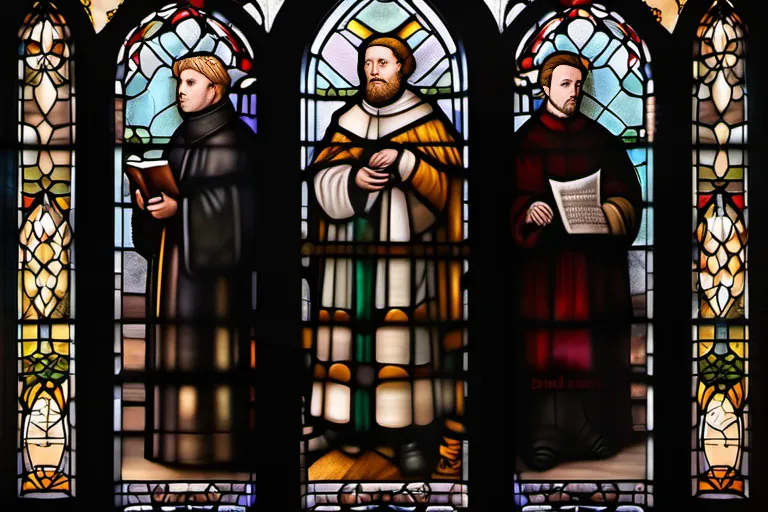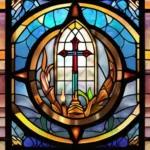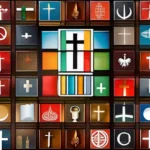Explore the historical, social, and religious factors that shaped the emergence of Protestantism.
Protestant beliefs have played a significant role in shaping Western civilization. This article delves into the origins of these beliefs, tracing their roots from the Reformation to the present day.
The Dawn of the Reformation
The dawn of the Reformation was like a spark that ignited the intellectual and religious landscape, reshaping Europe’s social fabric. Can you imagine how different the world would be if Martin Luther had never nailed his Ninety-Five Theses to the door of All Saints’ Church in Wittenberg on October 31, 1517? The air was thick with tension and discontent during that time, a perfect storm of religious and political factors.
Religious dissatisfaction had been brewing for centuries. The Catholic Church’s practices, such as the sale of indulgences, were seen by many as corrupt. People like Luther questioned these practices, leading to a deepening of spiritual doubt and a search for truth. Wasn’t the Bible meant to be the ultimate guide for salvation? Why was it being misinterpreted or used as leverage?
Politically, the German states were struggling under the weight of ecclesiastical taxes and the Church’s influence over their monarchs. The Holy Roman Empire, though a powerful entity, faced internal divisions that made it difficult to maintain uniformity in religious matters. Luther’s ideas challenged the status quo, making him both a hero to some and a heretic to others.
Imagine a farmer turning his back on years of tradition to question the very foundations of the Church. Luther’s actions were akin to planting a seed that would eventually grow into an entire forest. His arguments against the Church’s corruption resonated with many, sparking conversations and debates that spread like wildfire through Europe. These discussions often took place in local taverns and gatherings, where people began to openly question church practices.
The Reformation was not just about religion; it was a revolution of thought and action. It challenged the very nature of power, authority, and belief. As Luther’s ideas spread, they met resistance from various quarters. The Catholic Church saw him as an enemy and sought to suppress his teachings, while other reformers like John Calvin and Huldrych Zwingli developed their own interpretations, further dividing the religious landscape.
The Spread of Protestant Ideas
As we journey into the spread of Protestant ideas, it’s like following the ripples from a stone tossed into a still pond. The origins of these beliefs were deeply rooted in the social and religious landscape of early 16th-century Europe, but their expansion was nothing short of a wave that reshaped the very fabric of Christianity. Let’s delve into how key figures such as John Calvin and Huldrych Zwingli became pivotal in spreading these ideas across continents.
John Calvin, often referred to as the ‘second greatest reformer,’ after Martin Luther, played a crucial role in shaping Protestantism through his Institutes of the Christian Religion. His teachings spread far beyond Europe, influencing not only France and England but also reaching into Geneva where he established a model for governance based on biblical principles. Calvin’s ideas were like seeds planted in fertile ground, quickly growing into towering trees of reform. They emphasized predestination and the sovereignty of God, which resonated with many who sought clearer theological answers.
Huldrych Zwingli, on the other hand, was a Swiss theologian whose influence extended through the Zurich region. His approach to reform was somewhat different from Calvin’s, focusing more on the removal of Catholic practices and emphasizing a return to scriptural simplicity. Zwingli’s ideas spread through pamphlets and public debates, challenging the status quo in Switzerland and neighboring areas. The Second Zurich Disputation in 1525 was a pivotal moment that highlighted his influence, much like a powerful gust of wind dispersing seeds far and wide.
The spread of these ideas wasn’t just confined to the European continent; it began to reach out across the Atlantic. In England, under King Henry VIII, there were initial attempts at reform before the English Reformation fully took hold after his break with Rome. The Church of England, established in 1534, became a separate entity, adopting many Protestant beliefs but maintaining a form of liturgy and structure that was somewhat different from continental Protestants.
As we trace these movements, it’s almost as if history itself is telling us a story—of ideas that spread not just through the written word or public proclamation, but through the hearts and minds of those who embraced them. The path taken by Protestantism was complex, marked by both triumphs and challenges, but its enduring legacy continues to shape religious life across the globe.
Theological Differences and Conflicts
The theological differences that arose during the Reformation were like a wildfire spreading across Europe, fueled by deep-seated questions and conflicts within the Catholic Church. Was justification by faith alone, as Martin Luther proposed, truly at odds with church traditions? Or was it simply a matter of interpretation?
Luther’s famous statement, ‘Here I stand, I can do no other,’ rings through history as an echo of his unwavering commitment to his beliefs. His ideas challenged the very heart of the Church’s teachings and practices, sparking debates that would reverberate for centuries.
The role of sacraments became another contentious issue. For Luther, the Eucharist was a means of grace, but not in a transubstantiation sense as the Catholic Church taught. This shift in perspective opened up a Pandora’s box of theological arguments and counterarguments. Was the bread and wine actually transformed into Christ’s body and blood, or was it merely symbolic? The answer to this question became a dividing line between Protestants and Catholics.
The debates over these issues were not just academic; they had profound social implications. People began questioning authority, not only in religious matters but also in governance. The idea of individual interpretation of scriptures empowered the common person, shifting power dynamics that had been firmly held by the clergy and nobility for centuries.
As these theological differences spread like wildfire across Europe, it’s almost as if the old order was being challenged at every turn. Reformers like John Calvin in Geneva and Huldrych Zwingli in Zurich added their voices to the chorus of disagreement, each bringing a unique perspective that further complicated the landscape.
The conflicts over justification by faith alone and sacraments were not just about doctrine; they were about identity and power. In many ways, these debates foreshadowed the broader social and political changes that would come later in history, setting the stage for a Europe divided but also enlightened by the light of new ideas.
Protestantism in Europe and Beyond
The Thirty Years’ War was a complex and devastating conflict that had its roots deeply embedded in religious, political, and economic tensions. It’s almost as if the very soul of Europe was torn apart by these struggles, leaving behind a legacy that still echoes through history.
Protestantism played a pivotal role in this war, much like a fire that spreads across dry land. The conflict began with religious differences but quickly became entangled in power plays and territorial disputes among European powers. How could such a thing happen? Wasn’t religion supposed to be a unifying force?
Consider the case of Puritanism. These reformers were like a relentless wind, sweeping through England with their desire for religious purity and simplicity. They believed in a direct relationship between God and man, much like the way a bird flies directly towards its goal without distraction. This led to the rise of Puritan influence, which eventually culminated in the English Civil War.
But why did these conflicts persist? Could it be that the human heart is more complex than any doctrine or belief system could ever capture? The seeds of discontent sown during the Reformation had grown into a full-blown revolution, transforming not just religious practices but entire societies. It’s as if the old order couldn’t withstand the new winds of change.
The impact of Protestant beliefs on Europe was profound and far-reaching. From the political upheaval that reshaped monarchies to the cultural shift that emphasized individualism and education, the influence of Protestantism can be seen in almost every aspect of European life. Could it be that these changes were inevitable, or were they a direct result of the challenges posed by Protestant teachings?
As we reflect on this period, we are left with more questions than answers. How did such a small rebellion against the Church become a transformative force across an entire continent? The answer lies in the hearts and minds of those who dared to challenge the status quo. And just as these individuals changed history, so too can each one of us be part of something greater, no matter how small our actions might seem.
The Thirty Years’ War and the rise of Puritanism were not just events; they were pivotal moments that shaped the modern world. They remind us that change is always possible, even when it seems impossible at first glance. And perhaps, in understanding these historical forces, we can better navigate the challenges of our own time.
The Protestant Ethic and Capitalism
How can we explore the profound connection between Protestant beliefs and the rise of capitalism, as posited by Max Weber? The idea that there’s more to this relationship than just economic forces is quite intriguing. Could it be that certain Protestant doctrines laid a spiritual foundation for the burgeoning capitalist ethic?
In The Protestant Ethic and the Spirit of Capitalism, Weber argues that the Reformation’s emphasis on hard work, frugality, and self-discipline contributed to a cultural shift where individuals began to view success in monetary terms as a sign of divine favor. This is akin to saying that Protestantism transformed how people thought about their lives and the world around them.
Consider this: before the Reformation, wealth was often seen as a burden or even a curse, something to be avoided rather than pursued. But with Calvinist doctrines emphasizing the concept of predestination—where one’s salvation is determined by God from birth—the idea emerged that one could prove their worth through diligent work and financial success.
Can we see this shift in the way people approached business? Weber’s thesis suggests that Protestant ethics fostered a new attitude towards money, transforming it from something to be hoarded or squandered into a means for productive enterprise. This mindset paved the way for the entrepreneurial spirit and the pursuit of profit that became hallmarks of early capitalism.
It’s fascinating to think about how these ideas spread not just through Germany and England but across Europe, shaping economies in ways we still grapple with today. Could it be that the Protestant work ethic was more than just a religious concept—it was a catalyst for economic change?
The legacy of this connection between Protestantism and capitalism is evident even now. In our modern world, where religion’s influence on public policy and personal beliefs continues to evolve, understanding these roots helps us see how deeply intertwined our economic systems are with our spiritual values.
Protestantism in Modern Times
As we delve into Protestantism in Modern Times, it’s intriguing to ponder how this religious movement, born in the 16th century, continues to shape our world today. How did Protestant beliefs, rooted in a desire for reform and renewal within the Catholic Church, evolve to become a powerful force in contemporary society?
Imagine Protestantism as a river that, over time, split into various tributaries. Each stream represents different denominations—Calvinists, Lutherans, Baptists, Methodists—and each carries its unique flavors and influences. In the 21st century, these streams merge and diverge in unexpected ways, impacting social movements and religious diversity.
Consider social justice. How has Protestantism influenced modern activism? The abolition of slavery, women’s rights, and civil rights movements have all been propelled by Protestant values emphasizing equality and the inherent worth of every individual. Can we see a direct line from Martin Luther King Jr.’s speeches to the current fight for racial justice?
Moreover, religious diversity in modern society is another testament to Protestantism’s enduring impact. The fragmentation of Protestantism into numerous denominations has led to a rich tapestry of beliefs and practices that coexist alongside other religions. How does this diversity challenge or enhance interfaith dialogue and understanding?
In the digital age, Protestantism also finds new ways to connect with people through online communities, social media, and virtual churches. These platforms allow for global engagement and outreach, expanding the reach of Protestant teachings far beyond traditional geographical boundaries.
The influence of Protestant beliefs on contemporary society is profound and multifaceted. From the push for social reform to the creation of vibrant religious communities in an increasingly pluralistic world, Protestantism continues to resonate as a force for change and innovation. As we navigate the complexities of modern life, these historical roots offer valuable insights into our shared human experiences.
Conclusion
 By understanding the historical context and key figures involved, we can gain a deeper appreciation for the enduring impact of Protestantism on society and religion.
By understanding the historical context and key figures involved, we can gain a deeper appreciation for the enduring impact of Protestantism on society and religion.











